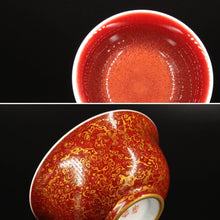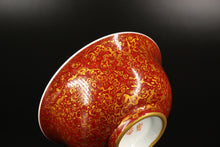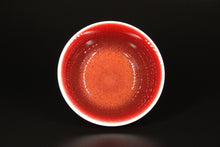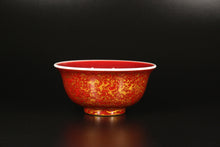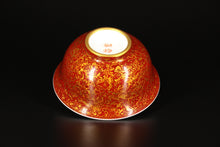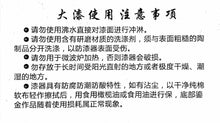
Volume at rim: approximately 100ml
Each cup is unique. Patterns of lacquer and jun glaze may vary slightly from that of the cup in the photos.
A small amount of real gold powder is applied as a pigment to a layer of lacquer applied to these cups
These cups are hand shaped and fired in a kiln before the layers of lacquer are applied by the artist. The inside is langhong glazed porcelain.
Langhong red was first created during the Qing Dynasty. While trying to reproduce the older recipe for Jihong red, a different red glaze (not as dark as jihong) was discovered and named Langhong. This fanggu teacup uses the old recipe for Langhong red.
After firing, payers of lacquer are applied to the outside of the cup.
The Chinese art of lacquerware is one that enjoys a long history, dating back thousands of years. The studio follows the traditional method of using sap from the Chinese lacquer tree (Toxicodendron vernicifluum, also known as Japanese sumac and varnish tree). After filtering and heat treating, the sap is mixed with pigments and applied as layers of varnish to the outside of the cups.
Different colored varnishes are applied at different layers and the cups are finished so that different layers are visible, giving the cups their unique layered form.
Caring for your lacquerware porcelain cup.
The lacquer is still reacting and curing for the first year. Special care needs to be taken for the first year of the cup’s life. After the first year, the lacquer has fully cured and hardened. Care still needs to be taken to maintain the beauty of lacquerware cups. Follow the instructions below to maintain the beauty of your lacquerware cup.
1. Take care not to scratch the surface of the cup when handling or cleaning (do not use any abrasive cloths, do not use detergent when cleaning the cup).
2. Never use a microwave.
3. Never place in direct sunlight for extended periods of time.
4. Do not store in extremely dry or humid environments.
5. Use a pure cotton cloth to wipe away dust. Lacquer can also be treated with a small amount of olive oil applied using a pure cotton cloth to maintain its luster.
6. Do not pour or submerge the outside of the cup/ the lacquer in very hot or boiling water.
7. Any lacquer that has been applied at the ring at the base of the cup may wear away over time. This is normal as the lacquer will wear with contact and friction.






